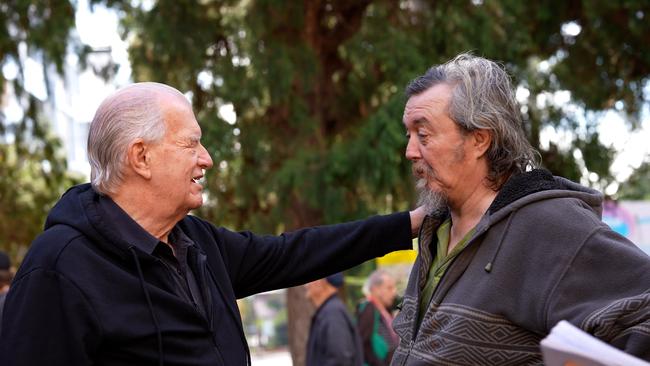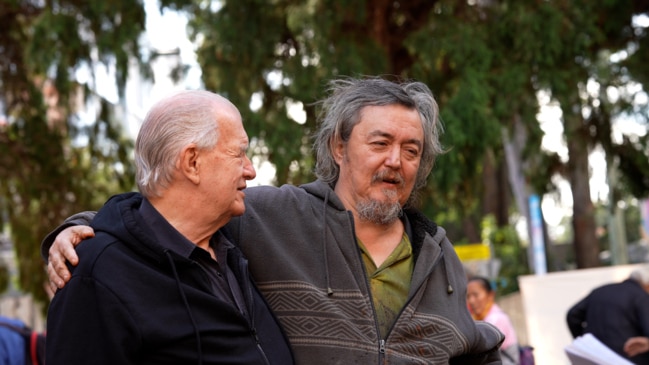Mental illness a ‘crisis of neglect’, says Exodus Foundation’s Bill Crews
Australia’s mental health policies support those suffering mild to moderate mental health distress while critically neglecting those with the most severe needs who are living lives of abject disadvantage | WATCH

Australia’s mental health policies have poured billions into “unachievable and ineffective” strategies to support an enormous proportion of the population suffering mild to moderate mental health distress while critically neglecting those with the most severe needs living lives of abject disadvantage.
The life expectancy gap for people living with schizophrenia is a shocking estimated 17 years compared to the rest of the population, almost double the Indigenous gap. Some estimates are even higher. However, no national efforts have been poured into this neglected section of the population, as many as a quarter of whom are homeless or in prison, with others subject to violence and exploitation in squalid boarding houses.
“Those with severe mental illness have the greatest disability and the highest needs,” says an editorial written by psychiatrists Jeffrey Looi, Stephen Allison and Steve Kisley in the Australasian Journal of Psychiatry. “It is unfortunate that Australian mental health policy has focused on full spectrum care for mild to moderate common mental health disorders across the whole population. This is unachievable with even heroic levels of resourcing, but also means that the needs of those with the most severe illness go unmet.”
Those with severe mental health problems make up only about 3 per cent of the population, but their healthcare and support needs are very significant and highly expensive. Their poor health outcomes and poor life expectancy costs the nation an estimated $200bn a year, or a staggering $550m to $600m a day, according to the Productivity Commission.
Severe underfunding by state governments of the severely mentally unwell has been ongoing for decades since asylums and hospital wards that provided long-term care and shelter for those with severe mental illness were closed down in the early 1990s. Such institutions were notorious for human rights abuses. However, community care and funding was never adequately put in place following the shutdowns.

The situation is now the worst it has ever been and comes amid a simultaneous escalating mental health workforce crisis. More than one in four public sector psychiatry positions in NSW is currently unfilled. People suffering psychosis frequently cycle in and out of hospital, to be released to short-term accommodation and a subsequent black hole of social and community healthcare supports. NSW just announced $111m in its budget to support community mental health, but it’s a drop in the ocean.
As it stands, it is often down to charity to provide for the severely mentally ill. The Bill Crews Exodus Foundation in the Sydney suburb of Ashfield is one of the few places such people can find shelter and sustenance. On a cold Sydney weekday, the line at this inner west haven where hot meals are served stretches out the door.
“These people don’t need anything more than other people are getting,” says Reverend Bill Crews, who began this foundation too many years ago to count. “They need love and care and community and support. That’s what they need. What everybody needs.”
Reverend Crews is in his 80s but will not retire. Too many people need him. He stands in the bright, thin winter sunlight in a courtyard with his arm around Simon, a middle-aged man who lives with severe mental illness.
Simon has a public housing flat but there are no community workers to check on him. Yet he’s happy with his lot. “Do they ever come to see you, when you get out of hospital?” Reverend Crews asks. “Nope,” says Simon with a rueful smile. “Are you happy with that?” probes the reverend.
“Yep.”
Simon’s gratitude is simple and genuine. But it’s thanks for nothing at all, from a man who has little inkling that he deserves so much more.
“The treatment and the support that was promised to people was not there, it has never been there,” says Reverend Crews. “I said back in the ’90s, people are going to be going from psych hospital to prison, or psych hospital to homelessness. And they all said ‘no, no, no, no, that won’t happen’. I said ‘well, where will they go?’. And they ended up either in jail, on the streets, or in these cheap, nasty boarding houses where 12 men share a toilet. Some of these people can’t even manage their medication.”
Asked to describe the plight of those with severe mental illness, Reverend Crews answers in one word. “Desperate. Desperate would be the word, and then a step up from desperate.
“Everything that was predicted came to pass, everything. People are now in jail that would have been in hospital in those days. It’s unconscionable. They could be your brother or your sister, they could be your daughter. We were sold an idea that didn’t work. What happens to those people. Where can they go?
“They’re the forgotten Australians. I know parents who pray that their child will die before they do, because their adult child is in terrible need, and they’re so worried about what will happen when they’re not there.”
The psychiatry journal editorial notes that the recent Bondi Junction stabbings “were the latest sentinel event that underlines the lack of comprehensive longitudinal care and support for those with psychotic disorders”. It’s a sentinel event that seems forgotten already.
Fiscal cupboards remain bare and the policy disasters roll on.
“While those with severe mental illness comprise only 3 per cent of the Australian population, their needs and the consequences of lack of psychiatric care and social supports are tragically illustrated in poor health outcomes, homelessness and significant risks,” professors Looi, Allison and Kisley say. “It is essential that Australian mental healthcare planning and delivery prioritises care around those with the greatest needs, within the bounds of what is currently possible.”
The latest federal budget poured more than $600m – the majority of new funds allocated to mental health by the commonwealth – into a national digital support website for people coping with mild to moderate distress. This infuriated some psychiatrists who question the model and point to a failed counterpart program in the UK. The spend comes as acute care psychiatric services are overwhelmed and understaffed, private hospitals are closing mental health beds at a rapid rate, and the neediest patients suffer dire and multilayered levels of disadvantage, with many never reached by healthcare at all.
As much as 50 per cent of the population say they have experienced a mental health problem in their lifetime, according to the latest census. The federal government spends $137 per session subsidising Medicare visits for psychologists for around 6.5 million consultations a year, but analysis has shown many of the people accessing the scheme are relatively privileged while rural and regional patients struggle to access mental healthcare. Meanwhile, 15 per cent of the total 2023 Australian population burden of disease arises from mental health and substance use disorders.
Former national mental health commissioner Allan Fels, the father of a daughter with schizophrenia, does not begrudge the less unwell healthcare but agrees the policy setting that’s described in academia as “horizontal equity”, meaning equal access for equal needs, is misguided. The alternative is “vertical equity”, which is prioritisation of the treatment of severe and disabling illnesses as a way to equalise health outcomes.
“There is no question that there is severe underprioritsation and severe underfunding for people at the very severe end of the mental illness spectrum,” says Professor Fels. “The 17-year life expectancy gap tells an extremely important story because the main reason for the big gap is the lifestyle and living conditions of people with severe mental illness. They don’t die relatively young because of their medical condition as such, nor does the higher suicide rate explain the gap.
“The gap is explained by the extremely poor physical health and associated poor living conditions of people with severe mental illness.” Medications for psychotic disorders can also cause severe cardiovascular events.
Professor Fels said he was also extremely concerned at looming NDIS cuts for supported living for people with severe mental illness – one of the greatest areas of need







To join the conversation, please log in. Don't have an account? Register
Join the conversation, you are commenting as Logout